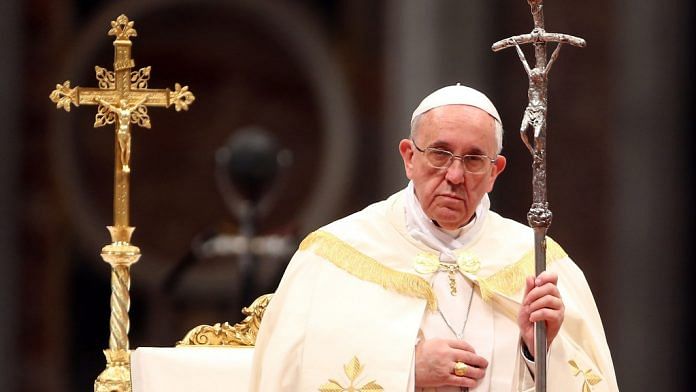The Vatican seems to have come up with the eleventh Commandment — ‘Thou shall not pass laws without our consent’. The Vatican and the Italian government are at loggerheads over a pro-LGBTQ bill. It’s a problem that many countries in the world are again struggling with — between church or religion and State.
The idea of secularism in single-religion societies in the West, especially in Europe comes under pressure when confronted with multiple religions. The Asian experience and especially the Indian social milieu have created a successful model of balancing between social, religious and state norms in a faith-divergent society.
Between papacy and rights
Italy’s ‘Zan Bill’, introduced by Alessandro Zan, an LGBTQ activist and legislator, punishes discrimination and incitement of violence against the community and against people with disabilities. The bill has been passed by the Italian parliament — in the face of strong far-Right and Catholic opposition — and has passed two hurdles in the Senate this week, bringing it one step closer to becoming a law. Except the church doesn’t like it. Even though Pope Francis has been quite ‘liberal’ in his views of homosexuality, the Vatican still considers it a sin. The church has argued that the Zan Bill curbs religious freedoms and is ‘vague’. The Washington Post headline read: When it comes to LGBTQ Catholics, what Pope Francis giveth, the Vatican taketh away.
Alessandro Zan has asserted that all concerns must be heard and all doubts dispelled, but ‘there can be no foreign interference in the prerogatives of a sovereign parliament’.
In India, a 2018 Supreme Court verdict scrapped the colonial-era law — Section 377 — that made sex “against the order of nature” a crime punishable by life in prison, and decriminalised homosexuality. Many religious outfits opposed the Supreme Court verdict on moral grounds saying that it was morally improper and against ‘the law of nature’.
The parties in the current debate in Italy would do well to study the Indian response to decriminalisation of the ‘unnatural’ relationship while emphasising on wider aspects of initiating social and psychological course correction empathetically. But given the contractual nature of the State-church relationship in Italy, there seems to be very little scope for a quick settlement of the issue.
Also read: ‘Same-sex marriage not a part of our culture’, says top govt lawyer, opposes plea in Delhi HC
The impact of Zan Bill
The Zan Bill, when passed, will be ‘an extension of an existing law that punishes racist violence, hatred and gender discrimination’. It also doesn’t exempt Catholic schools from observing a ‘national day’ against homophobia and transphobia, something the Church reportedly opposed.
The protest by the Vatican raises a centuries-old conflict between religious rights, freedom of thought and belief, and the sovereign right of parliaments. The Vatican has its own civil code through which its local administration functions. Many of its provisions are based on Italian law. But the Zan Bill poses a problem to the Lateran Pact that Italy signed with the Vatican in 1929.
The Lateran Pact of 1929 was signed by Benito Mussolini and Pietro Gasparri, and separated Italy and the Vatican City. It also secured the independence of the Pope. Italy also permitted religious instruction in public primary and secondary schools.
But the concordat of 1985 stripped Roman Catholicism of its status as State religion of Italy. This changed many things, and paved the way for a ‘secular’ Italy. Since then, Italian voters rejected pressure from the Catholic hierarchy and supported legalising divorce and abortion. With the new LGBTQ bill, the issue of conflict between moral diktats and secular laws has cropped up again.
The issue here is the Vatican would like to exercise its right over the Catholic citizens of Italy while the Italian laws like the Zan Bill will extend to schools run by the church. The Vatican strongly feels that while this will send wrong moral signals, the worst affected will be school children who will end up misunderstanding the information at an impressionable age.
Also read: Marxist Jesuits are not for tribal welfare. India and Indian Catholics both must realise that
Why this debate matters
Pope Francis, faced with increasing scandals in the Roman Catholic church, including sexual abuses, is known for a lenient view towards gay and lesbian issues. The Pope’s top aide Pietro Parolin also said that the Vatican wasn’t trying to block the LGBTQ bill, but flagging concerns.
But there seems to be no compromise with what the Vatican calls “gender theory”, which Pope Francis said was a “dangerous” cultural aim of erasing all distinctions between men and women that would “destroy at its roots” God’s plan for human beings. The conflict seems to be doctrinal rather than mere legal authority.
In the Indian social setting, the State was not allowed to dictate the religious dogma and nor was theology allowed to lay down the parameters of governance. There is perfect social balance between the various structures of governance and faith denominations coordinated by a set of eternal values in a changing society. Neither the State nor the religious heads act as jury in a given situation. The correctives seem to emerge from the unwritten value system that has been passed down from generations, duly amended from time to time. The theocratic and secular nation-states of Europe can begin to understand India better for their own benefit to avoid conflicts.
The big question is who will blink first in this new Italian ‘state versus church’ conflict.
The author is the former editor of ‘Organiser’. Views are personal.






